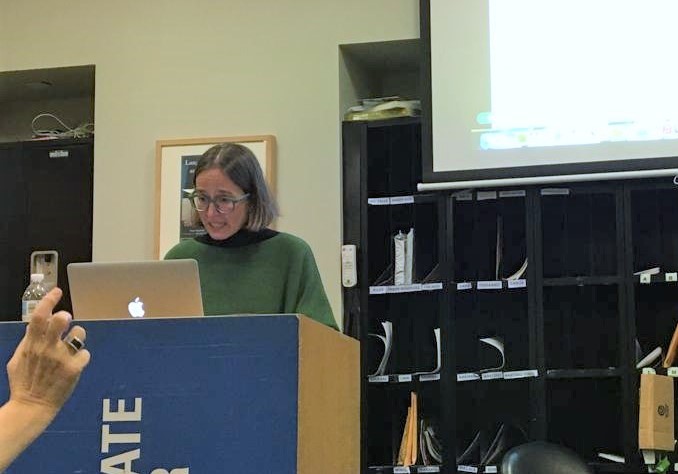08/05/2023
Laia Quílez, guest professor at the Mercè Rodoreda Chair at the City University of New York
She analysed the narrative and aesthetic strategies most commonly used by documentary makers to explain the Civil War and the Franco repression.

She analysed the narrative and aesthetic strategies most commonly used by documentary makers to explain the Civil War and the Franco repression.
Laia Quílez, head of the URV Department of Communication Studies has been invited to be visiting professor at the Mercè Rodoreda Chair of Catalan Studies at the City University of New York (CUNY). The Mercè Rodoreda Chair of Catalan Studies is part of the PhD Programme in Latin-American, Iberian and Latino cultures at the Postgraduate Centre of the City University of New York (CUNY). Created in 2003 and funded by the Institut Ramon Llull, every semester the Mercè Rodoreda Chair alternately offers a course in Catalan literature and culture and a course in Catalan sociolinguistics.
On this occasion, Laia Quílez gave a seminar on documentary cinema, a space open to creativity and the exploration of new forms and narratives that serve to shape polyhedral memories and heterogeneous voices. In particular, Quílez investigates the narrative and aesthetic strategies most commonly used by documentary makers to explain the Civil War and Franco repression, especially in the last two decades. In this period, a series of non-fiction films have been produced that argue for recovering the traumatic past of the Civil War and Franco’s repression, which often make characters, realities and aspects appear as unique cultures of this geography.
During the sessions, and by reflecting on the concepts of official memory, collective memory, post-memory, or counter-memory, among others, and by analysing the most representative fragments of the corpus, Laia Quílez has tried to map the narrative and aesthetic strategies most used by documentary makers to explain the memories of a recent past that still permeate our present. The seminar ended with a public lecture last Friday, 21 April: “Resistencias en femenino: género y (pos)memorias en el cine documental catalán sobre la guerra civil y el franquismo”.
Laia Quílez Esteve is the head of the Department of Communication Studies at the Universitat Rovira i Virgili and a member of the ASTERISC research group. She has a degree in Audiovisual Communication from the Autonomous University of Barcelona, and in Theory of Literature and Comparative Literature from the University of Barcelona. Her doctoral thesis dealt with post-memory and Argentine documentary cinema and, in 2017, she co-edited the book Posmemoria de la guerra civil y el Franquismo: Narrativas audiovisuales y producciones culturales en el siglo XXI (Editorial Comares).
